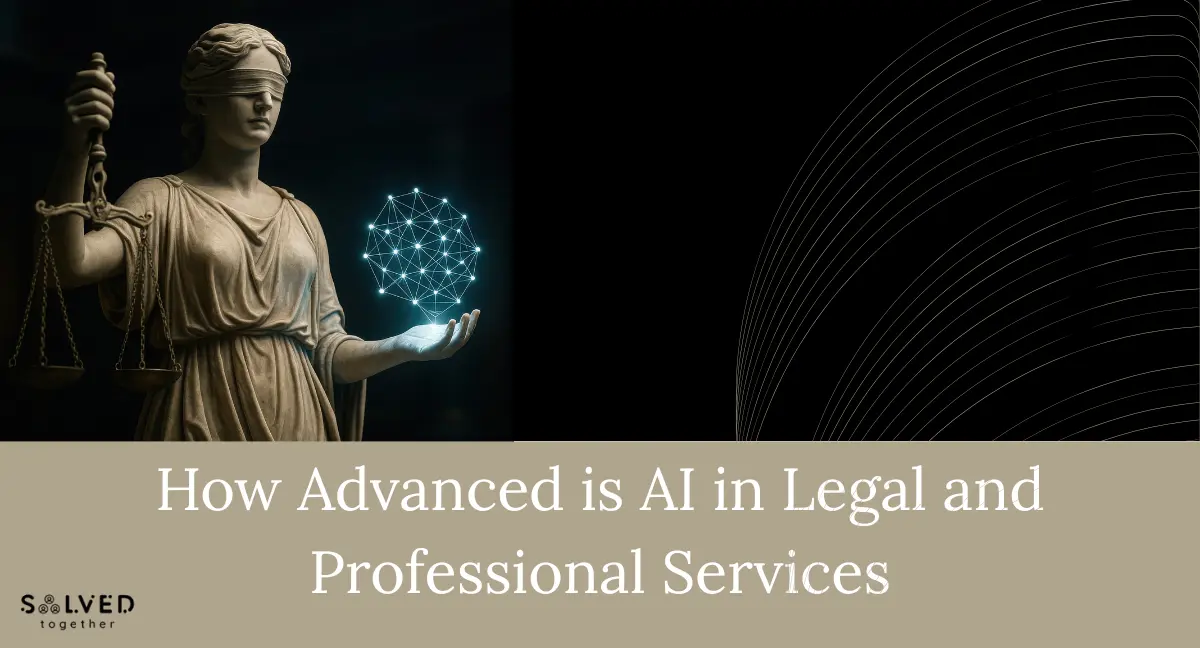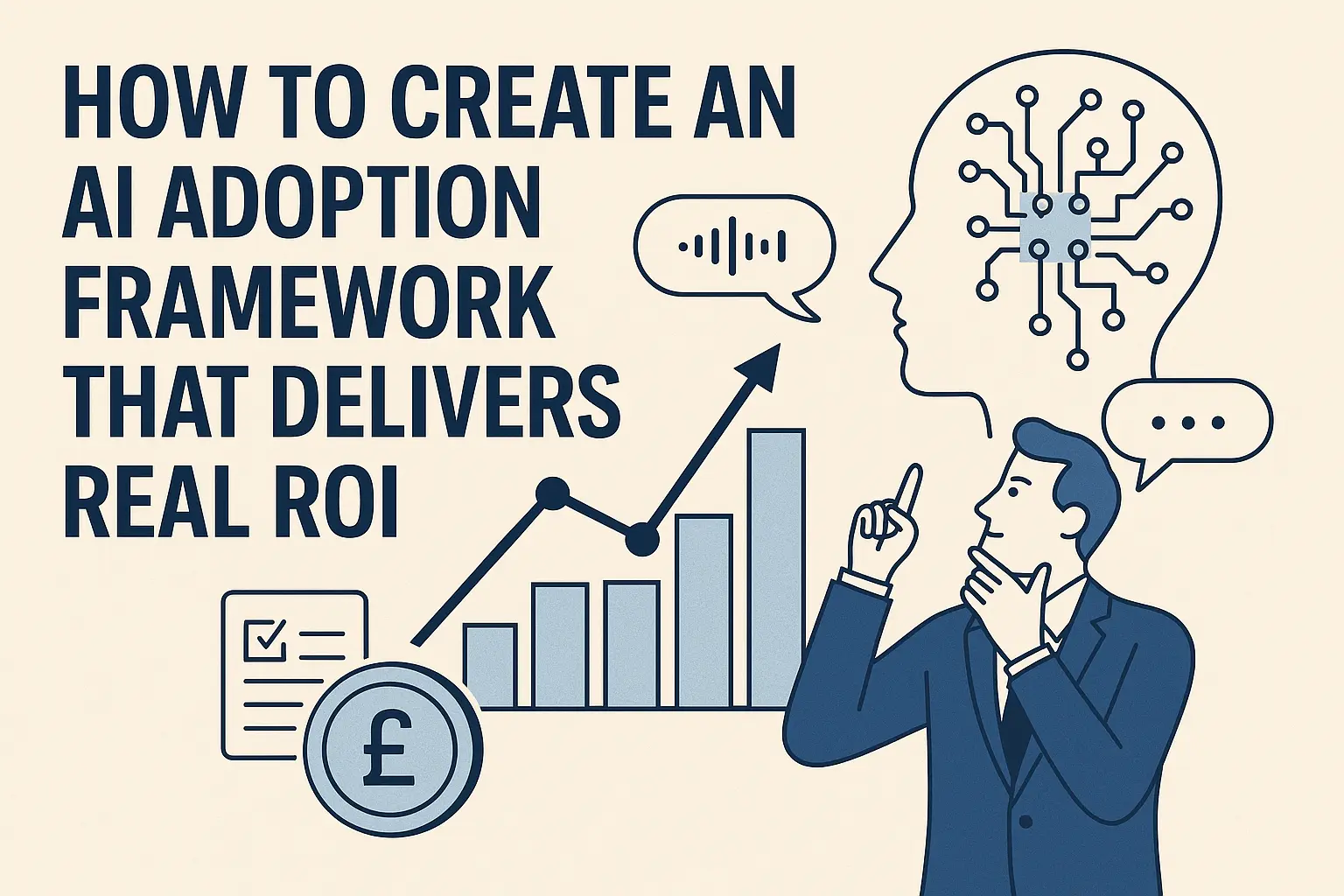TL;DR:
AI in professional services has moved beyond "helpful assistant" to "indispensable partner." 35.6% of legal professionals use AI for first-pass contract review, and 42.4% use AI for legal research. But here's the twist: AI still can't replace human judgment, client relationships, or strategic thinking. The firms winning aren't just using advanced AI—they're using it strategicall, while others debate whether it's "ready."
Last month's job posting from a top London law firm made me do a double-take: "Senior Associate needed. Must have experience with AI contract analysis tools. Traditional manual review experience optional."
Wait. Optional? When did five years of painstaking document review become the "nice to have" and AI fluency become the requirement?
That's when it hit me: we're not asking "Will AI change professional services?" anymore. We're asking "How advanced is AI?" and the answer is reshaping entire careers.
How Advanced is AI? The Professional Services Reality Check
Here's a conversation that happened in a Birmingham legal conference room last week:
Managing Partner: "How's that due diligence coming along?"
Associate: "AI finished reviewing 847 contracts overnight. Found 23 red flags."
Managing Partner: "...Overnight?"
Associate: "And cross-referenced them against our precedent database. Want the executive summary?"
This isn’t sci-fi banter. According to Thomson Reuters, 65% of law firms in 2025 now have either an AI strategy or a responsible-use policy (or both).
Translation: AI isn’t the intern anymore; it’s on the org chart. Meanwhile, auditors are doubling down: a Wolters Kluwer study found 39% of internal auditors already use AI, with adoption expected to hit ~80% by 2026
So yeah, “how advanced is AI?” Enough to make partners mutter “Overnight?!” a lot more often.
How Advanced is AI in Legal Services Today?

Contract Review and Risk Analysis
Remember when junior associates cut their teeth on mind-numbing contract review? Now, AI is chewing through 400-page merger agreements before you’ve even finished your oat latte. According to the 2025 Legal Tech Survey, 35.6% of legal professionals now use AI for first-pass contract review. Humans still sanity-check, but the drudgery? Gone.
One London associate told me their AI flagged a sneaky indemnity clause buried halfway through a subsidiary contract. Something three human reviewers had breezed past. That one catch saved the client seven figures. The machine didn’t need pizza, coffee, or a weekend off.
Legal Research Revolution
Remember when legal research meant disappearing into the library for days? (Younger lawyers: "What's a library?")
Today's advanced AI legal research capabilities:
- Processes 100,000+ case precedents in seconds
- Identifies relevant rulings across multiple jurisdictions
- Predicts case outcomes based on judge-specific patterns
- Draft preliminary briefs with properly cited sources
One Leeds solicitor joked, “AI gave me 47 relevant custody precedents in 90 minutes. Last time, I nearly grew cobwebs waiting for Lexis.”
So, how advanced is AI in legal research? Advanced enough that juniors are back to making coffee instead of casebooks.
How Advanced is AI in Accounting and Financial Services?
The easiest way to see just how far AI has come is to compare old workflows with what companies are doing today. Compared side by side, the difference is striking:
Transaction Processing and Audits
The advancement in AI auditing isn't just impressive. It's paradigm-shifting. Traditional auditing sampled 5-10% of transactions due to human limitations. AI-powered auditing reviews 100% of transactions, every single time.
The transformation in numbers:
- Traditional audit: 5% sample, 3-week timeline, 89% accuracy
- AI-powered audit: 100% analysis, 3-day timeline, 96% accuracy
Renata Miskell, a senior official at the U.S. Treasury Department, said:
"It's truly been revolutionary. Utilizing data has enhanced our capabilities in detecting and preventing fraud. AI and the use of data assist us in uncovering those concealed patterns and irregularities, allowing us to take preventive measures." (Source)
Reporting and Decision Support
How advanced is AI in financial reporting? Advanced enough that it doesn't just crunch numbers, it explains what they mean and predicts what comes next.
Advanced AI reporting capabilities:
- Real-time variance analysis with explanations
- Predictive cash flow modeling
- Automated regulatory compliance checks
- Strategic recommendation generation
Real example: A UK financial advisory firm case study shows success with AI-driven analytics optimizing investment strategies, improving decision-making, and client satisfaction by using powerful algorithms for data processing and risk prediction.
What AI Still Can’t Do in 2025 (Limits to Advancement)
Here's where the "how advanced is AI?" question gets interesting. Despite remarkable capabilities, AI in professional services still has clear limitations:
- Client Relationships: AI can analyze data, but it can't build trust over dinner or read between the lines in tense negotiations.
- Strategic Judgment: AI suggests options based on patterns, but it can't weigh business relationships, market timing, or reputational risks the way experienced professionals can.
- Creative Problem-Solving: When facing unprecedented legal or financial challenges, AI provides historical context, but humans create novel solutions.
- Ethical Decision-Making: AI identifies compliance issues, but complex ethical judgments still require human wisdom and experience.
The most successful businesses understand this balance. They use AI for speed and analysis, but reserve strategy and relationships for humans.
The Real Competitive Advantage: Adopting AI Early
The professional services world is splitting into two camps faster than anyone expected:
Camp 1: The Early Adopters
- Delivering services 80% faster than traditional firms
- Charging premium rates while maintaining higher margins
- Winning clients with capabilities competitors can't match
- Building AI expertise while others debate implementation
Camp 2: The "Wait and See" Crowd
- Losing clients to faster, more efficient competitors
- Burning out staff with manual processes, AI could eliminate
- Watching market share evaporate while debating "readiness"
- Playing catch-up in a game where the rules changed months ago
Industry research indicates that early-adopting companies are experiencing significantly higher growth rates compared to late adopters, though specific revenue figures vary by practice area and firm size.
Real quote from a thriving partner: "We're not just faster—we're better. Our AI catches things human reviewers miss. It's not even fair competition anymore."
The uncomfortable truth? The competitive advantage window is closing faster than a lawyer's office door at 6 PM on Friday. What felt like "early adoption" six months ago is becoming basic table stakes.
(Pro tip: when your "early adoption" strategy is six months behind, it's not early adoption, it's panic catching up.)
The Bottom Line on Professional Services AI
When people ask "How advanced is AI?" in professional services, the honest answer is: Advanced enough to transform practices, not advanced enough to replace professionals.
The sweet spot is using AI for what it does brilliantly. Pattern recognition, data analysis, and speed, while leveraging humans for what we do best - judgment, relationships, and strategy.
The companies thriving in 2025 aren't asking whether AI is advanced enough. They're asking how to stay ahead of competitors who are also advancing their AI capabilities.
Because in professional services, "advanced enough" isn't a destination, it's a moving target that shifts every quarter.
Ready to leverage advanced AI strategically? The technology is proven. The competitive advantage is real. Book an AI Strategy in a Day session to discover which advanced AI tools can transform your practice before your competitors do.
Next in this series: We’ve seen how advanced AI is today, but what about the risks, regulations, and responsibilities? Our next article will unpack AI governance in 2025: what businesses must know about compliance, trust, and staying ahead of regulators.
FAQs: How Advanced is AI in Legal and Professional Services?
How advanced is AI in legal document review?
About 35.6% of lawyers now use AI for contract review, cutting work from days to hours. [Rev 2025]
Can AI replace lawyers and accountants entirely?
No. AI speeds analysis, but human judgment, ethics, and client trust remain irreplaceable. [Thomson Reuters 2025]
How advanced is AI auditing technology in 2025?
39% of auditors use AI today, with adoption expected to reach ~80% by 2026. [Wolters Kluwer 2025]
What are the limits of advanced AI in professional services?
AI still struggles with ethics, strategy, creativity, and building client relationships. [Washington Post 2025]
How do I know if my firm needs advanced AI?
65% of law firms have an AI policy in 2025, showing it’s no longer optional. [Thomson Reuters 2025]
Why do some professional services firms resist advanced AI?
Leading tools include AI contract review, legal research engines, and audit platforms, shaping 2025 adoption. [Rev 2025; Wolters Kluwer 2025]

.svg)









.svg)